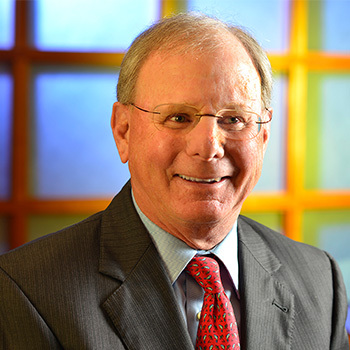Overview
Though not competing in any three-day events this year, John and his horse, Curly Mulloy, haven't let themselves go. They continue to push each other and maintain a rigorous training schedule.
Former Chair of the Firm's Executive Committee, John has practiced with Graydon since graduation from law school in 1972. He acts as counsel for many local and regional businesses and, as such, has significant responsibility as client manager for a number of the firm's clients. He is experienced in securities law in both public and private offerings, mergers and acquisitions and private equity. John's experience has focused on strategic legal counseling and general representation of business clients, including contract negotiation, mergers and acquisitions, and employment law issues. John is also experienced in Equine law and a Fellow of the American College of Equine Attorneys.
Based on the grading and comments of his peers, John is recognized with an AV Rating, the highest rating given to lawyers by Martindale-Hubbell. John has also been selected by his peers for inclusion in The Best Lawyers in America for his work in Commercial Litigation and Corporate Law from 2013-2016.
Education
University of Cincinnati, B.A., 1969
Georgetown University, J.D., 1972
Distinctions
AV Preeminent® by Martindale-Hubbell
Listed, The Best Lawyers in America® – Commercial Litigation; Corporate Law (2013–2016, 2025)
Professional Activities
American College of Equine Attorneys - Fellow
Cincinnati Bar Association - Member
NKU - Salmon P. Chase College of Law - Adjunct Professor of Equine Law (2011 - 2013)
AAA - Arbitrator
American Horse Council - Tax Advisory Panel Member
Brennan Equine Welfare Fund - Advisory Board Member
Cincinnati Eye Bank - President and Board Member
CISE Catholic Inner City Schools Annual Fund Drive - Volunteer
St. Joseph Orphanage - Board Member
Insights
Resource Centers
Outside The Office
John Kropp thinks you’re far more interesting than he is. Honestly, he says, he doesn’t have that much going on. His friends, colleagues and clients disagree. You have to like him, for lots of reasons. Bits and pieces emerge in conversation.
In the late ’60s, he played bass in a band called the New4. They had cabinets fabricated with no speakers inside so it would look like they were creating a wall of sound.
He considers his real name to be Johnny Mulloy, after his mother’s maiden name. He’s much more Irish than German at heart. He thinks he might’ve helped more people if he’d chosen to run a pub for his life’s work. “You serve medicine. People come in, they have troubles. When they leave, they don’t have troubles. Not those troubles, anyway.”
His abiding love of animals comes from his mother, who grew up in Edmonton. Her family farmed the land with draft horses. She traveled to school on horseback, riding miles through the Alberta winters to a barn to get warm again, then several more miles to school. John’s wife, Terry, trained race horses. She and John would run them at River Downs, Turfway, Keeneland, Beulah Park and Arlington near Chicago, the circuit.
His family moved to Finneytown from White Plains in 1950. The first time John sat astride an equine was at the Kissel Brothers pony ride on Galbraith Road. It cost a quarter. As soon as he thought he was at a place where no one could see him, he climbed down from the saddle. Had he gone the whole way around, he says, the ride would have been over. So he just sat there talking to the pony. He was maybe four years old.
These days, John and Terry compete in three-day events, one of the most demanding forms of the equestrian art, culminating in timed cross country trials involving an array of jumps with names like “elephant trap,” “coffin” and “shark’s teeth.”
“When you do these sorts of things with horses, you’re pushing them beyond their comfort zone. So you have a responsibility to do whatever you can to help them succeed. You have to connect with them and really care about them. What they give back to you is amazing. You could never do enough for them to repay what they will do for you.”
He just sort of universally gives respect. It galls him, for instance, when young attorneys don’t respect what he calls the people infrastructure. “I get upset when people don’t understand the importance of other peoples’ jobs to make them look good. You can’t lose sight of the people who make it possible for the rest of us to do our jobs.”
That perspective carries through to the way he sees himself in his work. “The profession of law is important, but the people in the profession are not. It’s the institution that matters – it’s the presidency, not the president. People will come and go, but the law remains. If we didn’t have the law to structure our society, we’d have anarchy. So the law is really very, very important. But the people who practice it are not any more important than anybody else who performs any honest function in this world.”

Admissions
- State of Ohio
- Commonwealth of Kentucky
